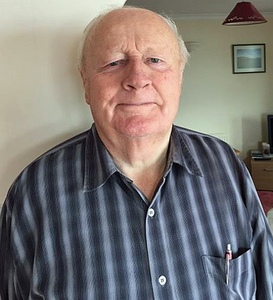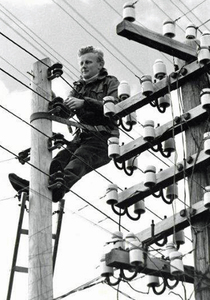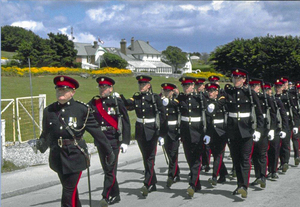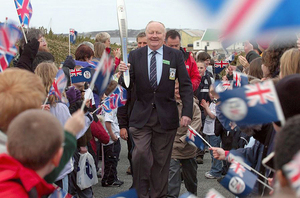CHEEK, GERALD WINSTON
b. 1941 from Falkland Islands
director of Civil Aviation, marksman, was born in Stanley, on 9 August 1941, the second son of Frederick John CHEEK (16 May 1911-14 August 1994) and Dorothy Mary Gladys Johnson (5 February 1915 - 27 January 1984). The Cheek’s first-born child, John Edward CHEEK (18 November 1939 – 3 September 1996) later became a noted local councillor and entrepreneur.
Gerald’s grandfather– Frederick CHEEK, (29 October 1880 - 22 December 1917) at the age of eight, owing to an accident, lost an arm, yet, in spite of this handicap, he learnt to perform all the duties of a shepherd with great efficiency, as well as being skilful at domestic chores such as cutting peat, wheeling a barrow and carrying a baby on horseback.
Gerald Cheek’s father was a shepherd at Hill Cove, but later he was to become a much-respected local councillor. The Cheek family moved into Stanley in 1946 so that their two sons, John and Gerald, could have a better education than was available in Camp in those days.
Gerald Cheek married Marie Middleton (b.1946) in October 1967, and they had two children – Diane (b.1968) and Barbara (b. 1972).
After leaving the senior school in Stanley, Cheek began to work as an apprentice electrician for Falkland Islands Government at the power station. During his service as an electrician, he became responsible for the distribution service which included the majority of all electrical systems both commercial and private - including FIG housing. He also stood in as a watch keeper attending to the Power Station’s diesel generators when the permanent watch keepers were on leave. Additional duties included reading of all the town`s electricity meters every quarter.
In September and October 1960 Cheek was part of the team which removed the Mirrlees generators from the ill-fated Ajax Bay Refrigeration plant onboard M/V Philomel. The generators were moved into Stanley and remained in service until May 1973.
During the 1960`s when HARDY`s cinema was operating in the Town Hall on Sunday evenings Cheek was one of the projectionists.
Cheek remained working for the Electrical Department until 1976 when he was appointed to the new post of trainee air traffic controller in preparation for working at Stanley Airport, which opened for operations in 1977. He spent most of 1976 training. with the Civil Aviation Department in England. In addition to working in the Control Tower, he managed the Falkland Islands Government Air Service (FIGAS) for eight years in addition to being the Director of Civil Aviation.
Cheek joined the Falkland Islands Defence Force (FIDF) in 1966 where he started full bore shooting. He soon became acknowledged as a marksman. His interest had begun with target shooting in the original FIDF Drill Hall, when he was a member of the Boys Brigade, which had an indoor small-bore range in the Drill Hall. He competed at Bisley in 1976 and he was able to practice at Bisley in 1982 en route to the Commonwealth Games in 1982.
After the Argentine invasion Cheek was arrested by the Argentine Military Police at his home on 27 April 1982, and flown to Fox Bay East on West Falkland. He was held there for seven weeks during the occupation of the islands.
Cheek and Tony Pettersson were chosen to represent the Falklands at the Commonwealth Games at Brisbane in 1982, just a few months after the end of the Conflict. The two men were the first competitors ever to represent the Falkland Islands at Commonwealth Games. They were introduced to Her Majesty the Queen who opened the Games. Well briefed she asked Cheek when he would be getting the new aircraft for the Government Air Service.
During his service in the FIDF he was awarded the Long Service Medal in 1978 (for twelve years’ service), the Efficiency Medal in 1996 (on promotion as an officer) and the 1982 South Atlantic Medal (with Rosette) for his part in the defence of the Islands on 1st/2nd April 1982.
In 1992 Cheek was invited by the British Antarctic Survey (BAS) to visit their base at Rothera on the Antarctic Peninsula. This involved a seven-and-a-half-hour flight from Stanley Airport in a Twin Otter aircraft. He then spent two weeks in the Antarctic flying on most days to various sites on the Peninsula delivering drums of aircraft fuel. A few years later he flew again to Rothera in the BAS Dash 7 aircraft. During his time in the Antarctic, he went on a flight to an ice runway.
In December 2001 Cheek retired from FIG after 45 years’ service - twenty years with the Power and Electrical Department and twenty-five years with civil aviation. In retirement he became a tour guide for passengers from cruise ships.
Cheek joined the Falkland Islands Committee (later to become the Falkland Islands Association) when it was originally formed in 1968. He later became the local treasurer.
In 2018 Gerald Cheek was chosen to carry the Queen’s Commonwealth Baton through Stanley prior to the Commonwealth Games in Queensland. He was accompanied by his granddaughter Laura.
References
For more information about the moving of the Mirrlees generators from Ajax Bay to Stanley see: Gerald Cheek; Removal of generators from Ajax Bay: Falkland Islands Journal; 2013; pp 81-89
For more information about Gerald Cheeks experiences during 1982 Falklands Conflict see: Gerald Cheek; Recollections of the Falklands War and Associated Matters; Falklands Islands Journal ; 2022; pp.123-147
Comments
Revisions
November 2023 Biography first added to Dictionary



